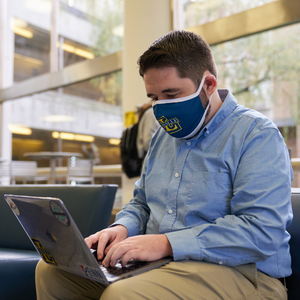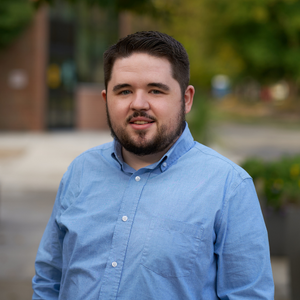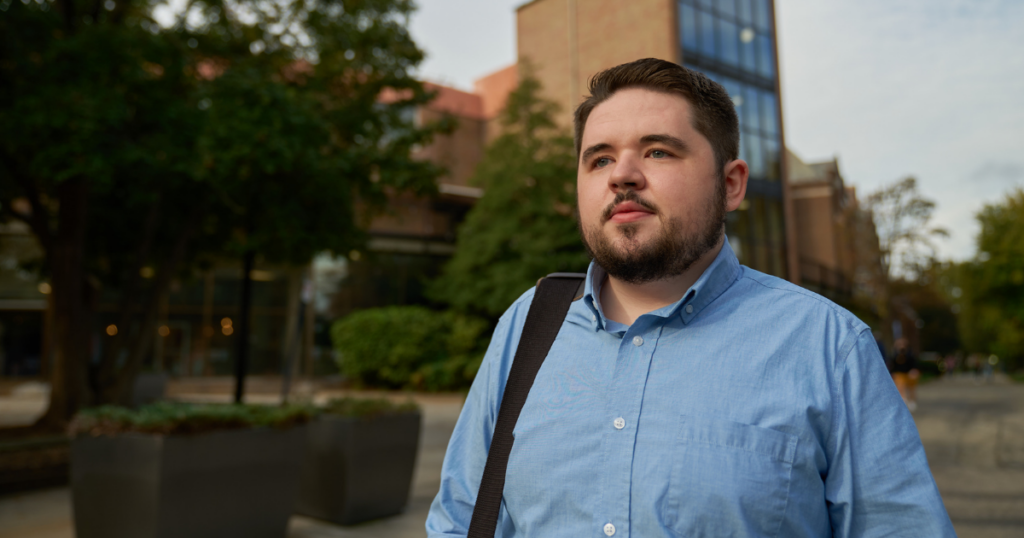La Salle University
Overcoming the odds
Nick Barbella, ’22, a social work major and first-gen student, is not defined by labels.
Nick Barbella’s life changed in the fifth grade.
At the time, he was reading at a second-grade level. An academic evaluation with a therapist would follow. The meeting lasted 30 minutes.
“He got frustrated with me, then he said I would never graduate from high school,” Barbella recalled. “In fact, he said I was incapable of achieving any success in life.”
Through degradation, Barbella found inspiration.
 This May, Barbella—a first-generation college student—will graduate from La Salle University with a bachelor of social work degree and a minor in sociology. The Northeast Philadelphia native has earned a cumulative grade-point average of 3.88.
This May, Barbella—a first-generation college student—will graduate from La Salle University with a bachelor of social work degree and a minor in sociology. The Northeast Philadelphia native has earned a cumulative grade-point average of 3.88.
For a majority of his childhood, those academic outcomes seemed completely unattainable.
Barbella lives daily with dyslexia, ADHD, and executive functioning processing disorder—just a few in a series of disorders and learning disabilities that inhibits his abilities to read, focus, and comprehend information. His elementary school, he said, had failed to deliver the resources he needed in order to keep pace with his classmates.
“My parents stepped in and assembled an amazing team of professionals, and they got me into the school I needed,” Barbella said.
It hasn’t been easy, Barbella said. His father, Joe, has worked professionally as a private chauffer and a truck driver. He is the family’s lone wage-earner, said Barbella, whose mother, Kelly, is unable to work due to a physical disability. (Conceiving children, she was once told, was unlikely.) For Barbella, the family has sacrificed summer vacations and more to ensure their only child received the educational support he needed.
Barbella’s story isn’t uncommon—even in his own family.
His father couldn’t complete his first semester of college, the result of what Barbella said is most likely an undiagnosed learning disability. His maternal grandfather, Larry, was illiterate until just five years ago. “He’s not the most emotional person,” Barbella said, “but he tears up every time he sees me and hears what I’m accomplishing academically. He tells me how proud I should be of my parents because of all they’ve done for me.”
National statistics suggest that Barbella is an anomaly among students with learning disabilities. Students seldom disclose their learning disabilities to their post-secondary schools. And only one in five learning-disabled students graduate from college within five years of finishing high school—a significantly lower total than their peers without disabilities.
“I don’t know if, four years ago, I would be able to say I am a senior in an undergraduate program if it wasn’t for La Salle.”
“Nick has always been a student that advocated for himself and for his learning community,” said Reg Kim, a student success coach in La Salle’s Center for Academic Achievement and an instructor of religion and theology. “In my course, he was transparent with me and with his fellow students about his efforts to manage his learning disabilities in a college setting. Because of his transparency, I learned a great deal about my own implicit ableism and the ableism embedded within our institutions.”
The odds have been stacked against Barbella his entire life, he said. When choosing a university, he knew he would need one that helped shift the odds into his favor.
“I heard from multiple people about how closely La Salle worked with students with disabilities, more so than other four-year colleges, and that was a big factor,” Barbella said. “Another has been how supportive my faculty here have been. They allow me to record classes, review presentations, and receive extended time on exams.”
He continued: “I don’t know if, four years ago, I would be able to say I am a senior in an undergraduate program if it wasn’t for La Salle.”
Mark A. Thomas, Ph.D., assistant professor of political science, witnessed Barbella’s transition to college. He led two fall courses in the first semester in which Barbella was enrolled at La Salle. Thomas recalled a student who was unsure of his ability.
 “In the four years I have known him, Nick has grown immensely in his knowledge and his capabilities, but most importantly and most critically in his level of self-confidence,” Thomas said, “and I am confident he will excel as a social worker.”
“In the four years I have known him, Nick has grown immensely in his knowledge and his capabilities, but most importantly and most critically in his level of self-confidence,” Thomas said, “and I am confident he will excel as a social worker.”
“Nick is always willing to see things from a multitude of perspectives, wrestle with something he may disagree with, and approach difficult topics with dignity and care,” said Adrienne Pollichemi, LCSW, the director of field education in La Salle’s Department of Social Work. “These are skills that will transcend his time at La Salle and support his advocacy and policy work as a professional social worker.”
Barbella supports fundraising and grant initiatives, among other functional areas, in a field placement at nonprofit Along the Way. The agency helps low-income single mothers in Greater Philadelphia obtain at-home childcare services at no cost, allowing them to pursue careers and complete their education. After graduation, Barbella expects to enroll in La Salle’s Master of Social Work program. He has one goal in mind.
“I want to make a difference,” he said. “It’s my life’s purpose to help others. I wouldn’t be here without similar help.”
—Christopher A. Vito
